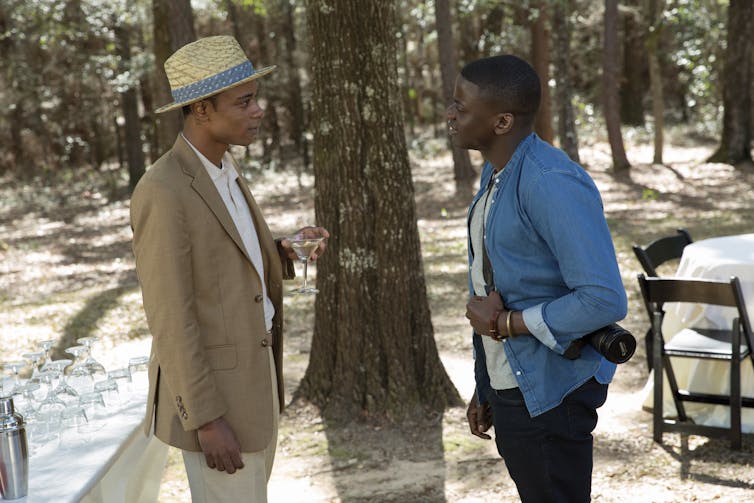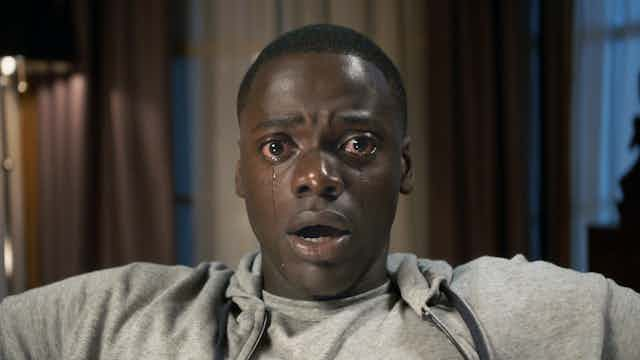Warning: this article contains spoilers
Get Out is a comedy-inflected horror story about what it means to be black in America. It’s Jordan Peele’s directorial debut, and until now he has been more widely recognised as one half of comedy duo Key and Peele. But as a director, he makes this movie work – even a little too well. In fact, the only thing more scary than the film are some of the reviews.
To summarise: a talented young black photographer called Chris (Daniel Kaluuya) goes on a trip with Rose, his white girlfriend (Allison Williams) to visit her parents. Having already worried that the parents might be racist, Chris is disturbed to find that the seemingly-liberal family has a number of black “servants” who behave like zombies, seemingly controlled and manipulated by an unseen force. He is further unsettled by (mostly white) visitors to the house who make gauche, racially-charged and fetishising comments, crooning over Chris’s “frame and genetic make-up” and announcing “Black is in fashion!”
Chris’s fears are realised, and worse. The Armitage family turn out not just to be racist, but to be pathological “negrophiles”. They have developed a horrifying system of abducting, brainwashing and ultimately brain-swapping black people, to use them as pets, sex slaves or repurposed body substitutes.
Rose’s hypnotherapist mother mesmerises Chris to make him believe that he is trapped at the bottom of a deep pit. And while Chris wonders how to escape without appearing rude, Rose’s neurosurgeon father auctions him off – to be stripped of his brain – to a blind art critic who wants nothing less than to “see through [his] eyes”.

Seasoned horror buffs will know that the standard resolution to a survival-horror film of this type (police turn up at the final hour, villain is dispatched, hero is saved, all’s well that ends well) is not to be anticipated. The “black guy always dies first” has become a self-reflexive horror-movie trope. And if Facebook Live videos have taught us anything, it’s that this uneasily applies to the real world as well.
Then again, we might also recall that other classic horror that happens to feature a black male protagonist. In George Romero’s 1968 film Night of The Living Dead the hero gets all the way to the end of the film, only to be shot dead by the authorities – just in time for the end credits.
The horrors of slavery
Coming in the wake of a slew of slavery-themed dramas such as Roots, Underground and Twelve Years a Slave, Get Out is a transparent nod to the genre. The slavery subtext is hinted at early on when we find that Rose’s liberal, professional mother goes by the name of “Missy”: a common appellation for the Mistress of a slave-holding. Yet the film’s subtle genius lies in its ability to trace almost invisible, yet indelible lines of continuity from the centuries-long slavery period to the present day.
Historically, anti-slavery rhetoric – which traces its own history back to the late 18th century – tended to focus on the inhuman physical conditions of the slave ship, and the moral incongruity of human chattel. There remains a cultural tendency to view the “horrors of slavery” in the same concretely objective terms, but it bears stating that white abolitionists were not necessarily of the opinion that blacks were equal to whites. They saw the practice of slavery as dehumanising and degrading to all those who participated in it. During the 19th century, slavery increasingly became both a liability and an embarrassment to what purported to be civilised societies.

This residual sense of embarrassment, shame and disavowal arguably persists in Western liberal democracies, where the recollection of slavery and its role in Western history is a source of discomfort. But this easy sense of revulsion doesn’t require one to address slavery’s underlying ideology of racial supremacy, much less the sexual fetishism and sadism that characterised much of its practice, as contemporary accounts will attest. What Peele’s film forces viewers to consider is whether such underlying power relations and warped desires remain wholly intact in our modern society.
What has often been missed in the discourse around slavery, and the persistence of post-slavery power relations, is the strategic and enduring psychology of slavery. It is this elusive quality that Peele’s film manages to capture.
The institution of slavery necessitated not just sailing and ironmongery skills, but a systematic regime – embedded in law, and lasting for centuries – of unrelenting terror, torture and dehumanisation resulting in absolute control over a cowed and docile workforce. Peele’s film parodies this on a micro-level. Rose’s family mentally break their victims using a multi-stage process that begins with hypnosis and ends with lobotomy. It is no accident that both Mr and Mrs Armitage are professional brain specialists.
Check your privilege
But what about those reviews? Variety calls it a “searing political statement” disguised as an “escape-the-crazies survival thriller” – where “the crazies are the liberal white elite, who dangerously overestimate the degree of their own enlightenment”. Since the “crazies” in question are complete psychopaths, I’d argue that they have very little investment in their own “enlightenment” – unless that term was intended as a pun.
Many reviews – this one included – describe Get Out exclusively as a satire on white liberal elitism, one which asks (white) viewers to “check their privilege”. But they are, perhaps, reading it from just such a privileged perspective. In so doing, they unwittingly repeat the dynamics parodied in the film, invalidating the black experience and ignoring the possibility that the film might not be primarily about the experience of whiteness, nor created specifically for the edification of white audiences.
But the Variety review gets worse. Besides a dubious comment about “love [being] color-blind”, the reviewer describes Chris as “a dark-skinned black man” – at which point I started making the same side-eyed facial expression that Chris makes when he first meets the liberally-racist parents. Why the need to doubly-emphasise his “darkness”?
This is a minor point, to be sure – and the comment was no doubt made innocently. But the effectiveness of Peele’s film plays on the very real fear that behind every throwaway racial remark lies something of an entirely more sinister magnitude. This, by the way, is what makes the “n” word so explosive.
That is to say, each of these uncomfortable moments threatens to reveal a deeply-entrenched racial ideology that some would say has both underpinned and facilitated the cultural and economic development of Europe and America during the past 400 years. Success relied not just on forced labour and territorial expansion/exploitation, but on the carefully-wrought ideologies that enabled it: crucially, the ideological conceit and pseudo-science of race and white supremacy. Colonialism, slavery and Nazi Aryanism evolved from the same fundamental set of beliefs.
The terrorism of white supremacy is that it is not only an extremist movement. It is the spectre haunting Get Out, just as it is the spectre that continues to haunt our modern, liberal societies. And in the gaslight of Trump’s America it is, quite literally, terrifying.

